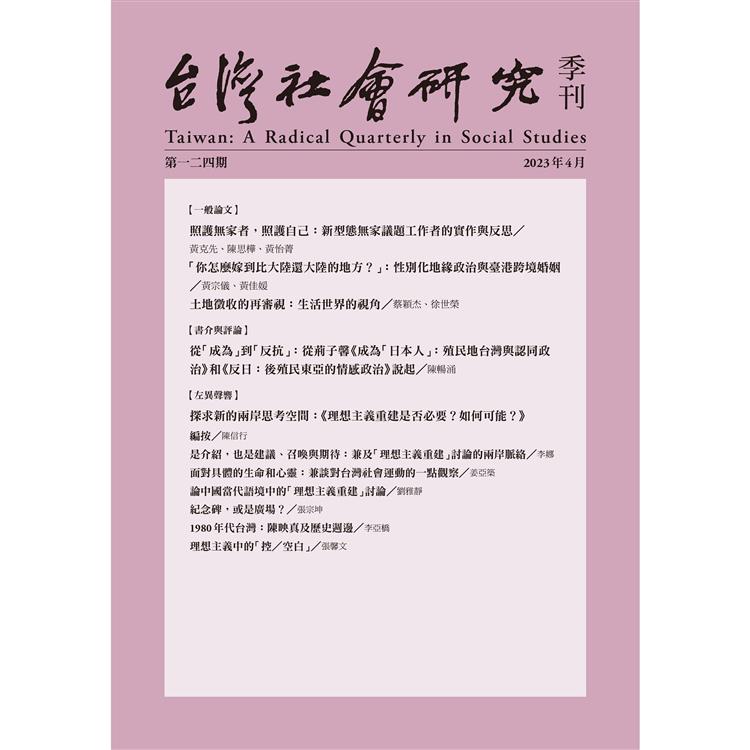節錄自〈照護無家者,照護自己:新型態無家議題工作者的實作與反思〉/黃克先、陳思樺、黃怡菁
無家可居是當代城市中難以處理的持存問題。台灣在民主化過程中發展出無家者社會福利體制,挹注更多資源並拓展更廣服務,但仍無法解決該問題,反使無家者陷入習得性無能及再被汙名化的處境。不過,近來無家者在社會被看待及對待的方式有了明顯變化,促此改變的重要力量是一群關注無家者議題之新型態組織的工作者。本文運用照護邏輯的理論概念,以參與觀察與深度訪談的材料,揭示他們如何以嶄新方式服務無家者並促成社會變革。
運用照護邏輯的實作可容許不確定性、非單向線性的工作模式,並納入無家者及其周圍同儕,藉共同作伙修補中提升福祉。無家者在參與過程中被鼓勵發聲,這些故事用以促進社會對話並去除無家者汙名。這種運用照護邏輯的實作對工作者本身也產生了迴向效果,讓他們照護無家者的同時也照護自己。他們在實作中反思自身生命歷程及現前處境,進而改善工作職場及家庭中的關係。由此,這群工作者的照護無家者的實作,不該簡單看待為愛心、耐心的個人道德特質之體現;他們打造出的照護異托邦具備著促成社會變革的基進潛力,對照既有受新自由主義影響的社福實況下,提供我們思考服務無家者中促成社會變革及助人工作者發展的可能性。
關鍵詞:無家者社會福利、照護的邏輯、共同作伙修補、實作反思、遊民
Homelessness has been a long-lasting, hardly tackled problem in modern cities. Although a more complete and well-funded social welfare regime for serving the homeless has been gradually developed in democratizing Taiwan, the homeless problem is not solved, and more problems such as learned helplessness and re-stigmatization emerge. However, the perception of homelessness and ways of treating the homeless in Taiwan have changed recently, due to efforts of workers from several new organizations for the homeless as the major forces facilitating such transformation. !is study, based on participant observation and in-depth interviews with these workers, reveals how they provide services to the homeless in the light of Annemarie Mol’s concept, “logic of care”.
As opposed to the traditional linear ways of caring that are worker-dominated, the working process adopting the logic of care involves both the homeless people themselves and these workers as fellows together in the process of shared doctoring. In the process of shared doctoring, the stories of homeless people are framed as narratives that facilitate social dialogue in public sphere. Meanwhile, through practices of caring for the homeless, these workers also in return develop ways of caring for themselves, reflecting on their own life course and current situations and endeavoring to transform relations in workplaces and families. !at is to say, we should not take these practices of caring by these workers simply as actions out of their individual morality such as love and patience rather than as possibilities of self-development of themselves. In sum, such heterotopia of care these workers construct not only serve as a critique of neoliberalist social welfare system but also may have the radical potential for social transformation.
Keywords: the social welfare for the homeless, the logic of care, shared doctoring, reflexivity in practice, unhoused people
| FindBook |
有 4 項符合
台灣社會研究季刊:第124期的圖書 |
| 圖書館借閱 |
| 國家圖書館 | 全國圖書書目資訊網 | 國立公共資訊圖書館 | 電子書服務平台 | MetaCat 跨館整合查詢 |
| 臺北市立圖書館 | 新北市立圖書館 | 基隆市公共圖書館 | 桃園市立圖書館 | 新竹縣公共圖書館 |
| 苗栗縣立圖書館 | 臺中市立圖書館 | 彰化縣公共圖書館 | 南投縣文化局 | 雲林縣公共圖書館 |
| 嘉義縣圖書館 | 臺南市立圖書館 | 高雄市立圖書館 | 屏東縣公共圖書館 | 宜蘭縣公共圖書館 |
| 花蓮縣文化局 | 臺東縣文化處 |
|
|
圖書介紹 - 資料來源:TAAZE 讀冊生活 評分:
圖書名稱:台灣社會研究季刊:第124期
【學會簡介】
《台灣社會研究季刊》社籌備於1980年代台灣解嚴前的時空背景,企圖以學術為主戰場,採取論述干預的方式成立台灣第一份批判性的學術刊物。成立二十多年來,針對廣泛的社會議題,進行研究討論,至2013年6月共計出刊91期。《台社》堅持學術論述須與社會現實緊密結合,而非學究的冥想,因此各期討論主題皆涉及台灣關鍵的社會現實與矛盾,包括民主化、分配政治、全球化、移民/工、階級、性別、國族……等等,是立足台灣的華文國際刊物,在過去二十多年的累積中,已經成為華文世界最有影響像力的學術刊物,並多次獲得國科會優良學術期刊獎助。
【台灣社會研究雜誌社】
擘劃於戒嚴時期,誕生於80年代社運烽火之中,多年來《台社》持續力耕批判學術,在廣大中文世界中應屬獨特。關懷在地、立足區域、面向世界,賡續並創新批判傳統,是這個刊物繼續前進的動力與願景。
網址:https://www.taishe.com.tw/
作者簡介:
透過學術期刊、研討會、論壇等形式,《台社》不但吸引了更多年輕學者的加入,在人文社會學界、社運團體、學生社團等諸多社群中具有一定的影響力。香港出版的《二十一世紀》「兩岸學刊評選」因而對《台社》做了如此的評論:「《台社》以議題延續了台灣讀者對它的關注與閱讀興趣,過去對國族主義、族群論述的適時掌握與回應,為台灣知識界激起一波浪濤,這充分說明《台社》以議題激化討論與反省的強大功能。」《台社》的影響力亦逐漸受到國際的注目,由2003年社論〈邁向公共化、超克後威權〉刊登於 Boston Review 可見一斑。
章節試閱
節錄自〈照護無家者,照護自己:新型態無家議題工作者的實作與反思〉/黃克先、陳思樺、黃怡菁
無家可居是當代城市中難以處理的持存問題。台灣在民主化過程中發展出無家者社會福利體制,挹注更多資源並拓展更廣服務,但仍無法解決該問題,反使無家者陷入習得性無能及再被汙名化的處境。不過,近來無家者在社會被看待及對待的方式有了明顯變化,促此改變的重要力量是一群關注無家者議題之新型態組織的工作者。本文運用照護邏輯的理論概念,以參與觀察與深度訪談的材料,揭示他們如何以嶄新方式服務無家者並促成社會變革。
運用照護邏...
無家可居是當代城市中難以處理的持存問題。台灣在民主化過程中發展出無家者社會福利體制,挹注更多資源並拓展更廣服務,但仍無法解決該問題,反使無家者陷入習得性無能及再被汙名化的處境。不過,近來無家者在社會被看待及對待的方式有了明顯變化,促此改變的重要力量是一群關注無家者議題之新型態組織的工作者。本文運用照護邏輯的理論概念,以參與觀察與深度訪談的材料,揭示他們如何以嶄新方式服務無家者並促成社會變革。
運用照護邏...
顯示全部內容
目錄
【一般論文】
照護無家者,照護自己:新型態無家議題工作者的實作與反思/黃克先、陳思樺、黃怡菁
「你怎麼嫁到比大陸還大陸的地方?」:性別化地緣政治與臺港跨境婚姻/黃宗儀、黃佳媛
土地徵收的再審視:生活世界的視角/蔡穎杰、徐世榮
【書介與評論】
從「成為」到「反抗」:從荊子馨《成為「日本人」:殖民地台灣與認同政
治》和《反日:後殖民東亞的情感政治》說起/陳暢涌
【左異聲響】
探求新的兩岸思考空間:《理想主義重建是否必要?如何可能?》
編按/陳信行
是介紹,也是建議、召喚與期待:兼及「理想主義...
照護無家者,照護自己:新型態無家議題工作者的實作與反思/黃克先、陳思樺、黃怡菁
「你怎麼嫁到比大陸還大陸的地方?」:性別化地緣政治與臺港跨境婚姻/黃宗儀、黃佳媛
土地徵收的再審視:生活世界的視角/蔡穎杰、徐世榮
【書介與評論】
從「成為」到「反抗」:從荊子馨《成為「日本人」:殖民地台灣與認同政
治》和《反日:後殖民東亞的情感政治》說起/陳暢涌
【左異聲響】
探求新的兩岸思考空間:《理想主義重建是否必要?如何可能?》
編按/陳信行
是介紹,也是建議、召喚與期待:兼及「理想主義...
顯示全部內容
|












